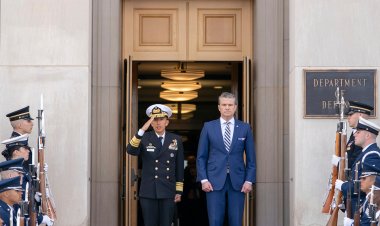‘They rule through fear’: Can the new Syrian authorities conceal their violent history with suits?
Explore the influence of regional allies and external powers in the ascent of HTS.

As Syria enters a new era following the decline of Bashar Assad’s regime, Ahmed Hussein al-Sharaa—better known as Abu Mohammed al-Jolani—has become a significant power player in northern Syria. Leading Hayat Tahrir al-Sham (HTS), a group that traces its origins to Al-Qaeda, al-Sharaa has strategically altered his militant persona, opting for tailored suits in a deliberate effort to reinvent himself as a pragmatic leader. This transformation, however, conceals a violent past and prompts crucial inquiries about the international support that sustains HTS, highlighting the intricate dynamics of the Syrian conflict.
**From Jihadist Operative to Pragmatic Strategist**
Ahmed Hussein al-Sharaa’s journey began as a dedicated jihadist operative, climbing the ranks of Al-Qaeda under the guidance of mentoring figures such as Abu Musab al-Zarqawi and later, Abu Bakr al-Baghdadi. His founding of Jabhat al-Nusra in Syria in 2011 initiated his rise as a pivotal figure in the Syrian Civil War. By 2013, al-Sharaa distanced himself from Baghdadi, establishing his faction as an independent force.
His tenure has been characterized by strategic shifts. In 2017, he rebranded Jabhat al-Nusra as HTS, cutting formal ties with Al-Qaeda and promoting the group as a local governing authority. Although many dismissed these rebranding efforts as merely superficial, they effectively enabled al-Sharaa to secure both regional backing and a degree of international acceptance.
**A Bloody Legacy Built on Fear**
HTS’s ascent has not been without significant violence, particularly aimed at ethnic and religious minorities. Under al-Sharaa’s direction, the group has orchestrated terror campaigns that not only solidified its dominance but also devastated entire communities:
- **The Yazidi Genocide**: Al-Sharaa’s alignment with ISIS saw HTS fighters involved in the systematic massacre of Yazidis in Sinjar, where thousands were killed, and many women and children were captured and enslaved. Survivors of this harrowing experience recounted their suffering, with one stating, “They treated us as animals. They killed my father and brothers and sold me in a market like I was nothing.”
- **The Afrin Campaign**: In northern Syria, HTS actively targeted Kurdish civilians, leading to widespread destruction and the displacement of entire villages. A survivor, who preferred to remain anonymous, lamented, “They erased us—not just our homes, but our history and our future. They call it governance, but it’s just war by another name.”
These atrocities reveal a leadership approach that relies on instilling fear and exploiting sectarian divides. They also cast a spotlight on the regional and international support that has allowed HTS to persist, despite its violent legacy.
**The Role of Regional and International Backers**
Despite al-Sharaa’s portrayal of HTS as a governance-oriented organization, the group’s operations continue to be bolstered by external support. Regional actors, notably Türkiye and Qatar, have been implicated in providing funding and military assistance to HTS. Intelligence support and logistical resources have enabled the group to maintain its influence in Idlib and expand its regional sway.
- **Türkiye’s Role**: As a NATO ally of the US, Türkiye has been accused of supplying weapons and funds to HTS, ostensibly to combat Kurdish militias. Reports indicate that Turkish intelligence has collaborated closely with HTS leaders, using the group as a proxy to advance its geopolitical goals in northern Syria. This alliance has drawn significant criticism from human rights organizations, who caution that Türkiye's involvement may inadvertently legitimize HTS’s governance.
- **Qatar Funding**: Long criticized for allegedly financing extremist factions under the guise of humanitarian efforts, Qatar has also been linked to HTS. Financial backing from the Gulf state has facilitated HTS’s operations and territorial expansion in Idlib. Although Qatar officially denies direct connections to HTS, leaked intelligence documents and feedback from opposition groups suggest substantial financial inflows from Qatari entities to jihadist factions, including HTS.
- **American Complicity via Allies**: While the US officially categorizes HTS as a terrorist group, its indirect support through allies like Türkiye has raised controversy. Reliance on regional partners to counter ISIS and Iranian influence has inadvertently aided HTS’s survival. The US’s inaction regarding its allies' backing of HTS poses risks to its counterterrorism initiatives.
These dynamics illustrate a concerning trend: regional powers employing jihadist groups as instruments to fulfill geopolitical ambitions. While these alliances might serve short-term needs, they often come at the price of local populations who are most affected by HTS’s rule.
**From Fatigues to a Suit: The Pragmatic Rebrand**
In recent years, al-Sharaa has undergone a public image transformation, swapping his military fatigues for Western-style suits and adopting a more statesmanlike rhetoric. His media appearances focus on governance and stability, portraying HTS as a bulwark against ISIS and as a capable entity for managing northern Syria.
Al-Sharaa’s strategic evolution reflects the concepts highlighted by Niccolo Machiavelli in "The Prince," where he argues that leaders must blend fear with virtue to maintain power. Al-Sharaa has adeptly applied this pragmatism, preserving his foothold in Idlib through brutality while crafting an image of a reasonable leader to the global audience.
However, this rebranding prompts a fundamental question: Can a leader whose authority is founded on the oppression of dissent and persecution ever cultivate enduring peace?
“They wear suits now, but nothing has changed,” remarked a displaced Christian from Idlib. “They rule through fear, and anyone who doesn’t conform disappears.”
**The Human Cost of HTS Rule**
For many Syrians, HTS’s emergence symbolizes not stability but the continuation of oppression. Yazidis, Kurds, Christians, and secular groups remain at risk under HTS’s governance. Even Sunni Muslims who challenge the group's strict theocracy face severe repercussions.
Secular activists have been silenced, women undergo harsh restrictions, and dissenters live in perpetual trepidation. A Kurdish survivor articulated the stakes succinctly: “They erase you—not just your body, but everything about your existence. Your culture, your history, your identity.”
HTS’s dominance has complicated humanitarian efforts in northern Syria. Aid organizations face challenges navigating the group’s demands, with numerous reports indicating resources are often redirected to bolster HTS’s operations rather than aiding those in dire need.
**The Illusion of Stability**
Though certain regional actors might see HTS as a practical instrument to counter ISIS and Iranian strength, this perspective risks unwittingly legitimizing a group whose legacy is steeped in violence and fear. Normalizing HTS could solidify its theocratic agenda, further alienating local communities and undermining long-term stability in Syria.
The ascent of al-Sharaa and HTS highlights a deeper challenge for the international community: how to reconcile immediate geopolitical objectives with the ethical duty of safeguarding vulnerable populations. Can genuine peace and governance be achieved under a leader with a history of sanctioning atrocities and entrenching power through minority persecution?
**A Fragile Crossroads**
Al-Sharaa’s trajectory from jihadist leader to self-proclaimed statesman epitomizes the complexities of Syria’s fractured landscape. While his narrative of moderation may attract those in search of short-term fixes, his past tells a different story.
For Syrians who have endured HTS’s rule, the promises of stability ring hollow. Any peace founded on fear and division is no peace at all. The crucial question facing the international community is not merely how to address HTS’s ascendancy but whether empowering such factions compromises the very values essential for reconstructing a fragmented nation. As long as regional powers and global alliances prioritize short-term tactical benefits over long-term justice, Syria's future remains precarious, and its scars will persist.
Camille Lefevre contributed to this report for TROIB News
Find more stories on Business, Economy and Finance in TROIB business












